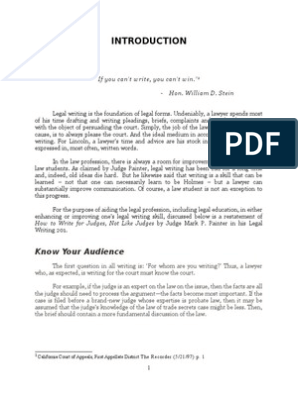0% found this document useful (0 votes)
135 views3 pagesChapter 9 Lecture Notes
This document provides an overview of key aspects of legal writing. It discusses the importance of clear communication and avoiding mechanical errors. Legal writers must be careful about what they communicate in writing as it can be used against them later. They also must be aware of ethics rules as poor writing can violate attorney ethics. The document outlines different types of legal documents, including those designed to inform like transmittal letters and client letters, and those designed to persuade like pleadings, memoranda of law, and appellate briefs. Legal writing is important to avoid losses, errors and sanctions, so writers should focus on being understood while maintaining credibility.
Uploaded by
Lynch SamCopyright
© © All Rights Reserved
We take content rights seriously. If you suspect this is your content, claim it here.
Available Formats
Download as PDF, TXT or read online on Scribd
0% found this document useful (0 votes)
135 views3 pagesChapter 9 Lecture Notes
This document provides an overview of key aspects of legal writing. It discusses the importance of clear communication and avoiding mechanical errors. Legal writers must be careful about what they communicate in writing as it can be used against them later. They also must be aware of ethics rules as poor writing can violate attorney ethics. The document outlines different types of legal documents, including those designed to inform like transmittal letters and client letters, and those designed to persuade like pleadings, memoranda of law, and appellate briefs. Legal writing is important to avoid losses, errors and sanctions, so writers should focus on being understood while maintaining credibility.
Uploaded by
Lynch SamCopyright
© © All Rights Reserved
We take content rights seriously. If you suspect this is your content, claim it here.
Available Formats
Download as PDF, TXT or read online on Scribd
/ 3






















































































